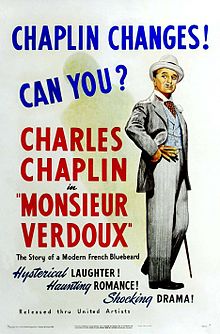Comedie neagră
Aspect

O comedie neagră sau comedie grotescă este o lucrare de comedie care conține elemente de umor negru.[1] Definiția umorului negru este problematică, s-a afirmat că aceasta ar corespunde conceptului de umor macabru.[2][3][4][5][6]
Termenul Umor negru (din franceză; humour noir) a fost inventat de către teoreticianul suprarealist André Breton în 1935,[7][8] pentru a desemna un subgen al comediei și al satirei, în care râsul rezultă din cinism și scepticism,[7] de multe ori bazându-se pe teme cum ar fi moartea.[9][10]
Exemple
[modificare | modificare sursă]Film
[modificare | modificare sursă]- 1947 Domnul Verdoux (Monsieur Verdoux), regia Charlie Chaplin
- 1964 Fata în doliu (La Niña de luto), regia Manuel Summers
- 1985 O noapte ciudată (After Hours), regia Martin Scorsese
- 1994 Pulp Fiction, regia Quentin Tarantino
- 1999 American Beauty, regia Sam Mendes
- 2003 Moșul cel rău (Bad Santa), regia Terry Zwigoff
- 2017 El Camino Christmas, regia David E. Talbert
Desene animate
[modificare | modificare sursă]- Happy Tree Friends
- Mr. Pickles
- South Park
- Rick and Morty
- Povestiri din criptă
- Draculas Vampirul Iepuras
Note
[modificare | modificare sursă]- ^ Merriam-Webster, Inc (1995) Merriam-Webster's encyclopedia of literature, entry black humor, p.144
- ^ Garrick, Jacqueline and Williams, Mary Beth (2006) Trauma treatment techniques: innovative trends pp.175-6
- ^ Lipman, Steve (1991) Laughter in hell: the use of humor during the Holocaust, Northvale, N.J:J Aronson Inc.
- ^ Kurt Vonnegut (1971) Running Experiments Off: An Interview, interview by Laurie Clancy, published in Meanjin Quarterly, 30 (Autumn, 1971), pp.46-54, and in Conversations with Kurt Vonnegut, quote: „The term [Black Humor] was part of the language before Freud wrote an essay on it -- 'gallows humor.' This is middle European humor, a response to hopeless situations. It's what a man says faced with a perfectly hopeless situation and he still manages to say something funny. Freud gives examples: A man being led out to be hanged at dawn says, 'Well, the day is certainly starting well.' It's generally called Jewish humor in this country. Actually it's humor from the peasants' revolt, the thirty years' war, and from the Napoleonic wars. It's small people being pushed this way and that way, enormous armies and plagues and so forth, and still hanging on in the face of hopelessness. Jewish jokes are middle European jokes. And the black humorists are gallows humorists, as they try to be funny in the face of situations which they see as just horrible.”
- ^ Bloom, Harold (2010) Dark Humor, ch. On dark humor in literature, pp.80-88
- ^ Freud (1927) Humor
- ^ a b Real, Hermann Josef (2005) The reception of Jonathan Swift in Europe, p.90 quote: „At least, Swift's text is preserved, and so is a prefactory note by the French writer André Breton, which emphasizes Swift's importance as the originator of black humor, of laughter that arises from cynicism and scepticism.”
- ^ Lezard, Nicholas (). „From the sublime to the surreal”. The Guardian. London. Text " authorlink-Nicholas Lezard " ignorat (ajutor)
- ^ Thomas Leclair (1975) Death and Black Humor[nefuncțională – arhivă] in Critique, Vol. 17, 1975
- ^ . JSTOR 306869. Lipsește sau este vid:
|title=(ajutor)
| ||||||||||||||
